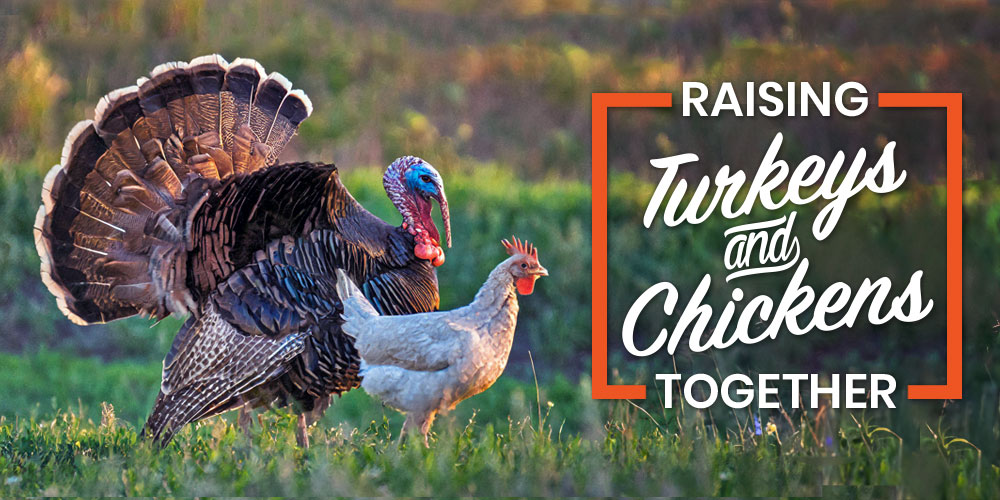
NAVIGATION
As a homesteader raising turkeys and chickens and someone who’s always looking to simplify, I wondered … can turkeys and chickens live together?Then, I put what I learned into practice on my homestead and moved my chickens into my backyard turkey coop to get acquainted with their new coop mates.
I found it possible to create a harmonious environment where turkeys and chickens live together while maximizing the benefits of cohabitation, and I’m sharing what you need to know.
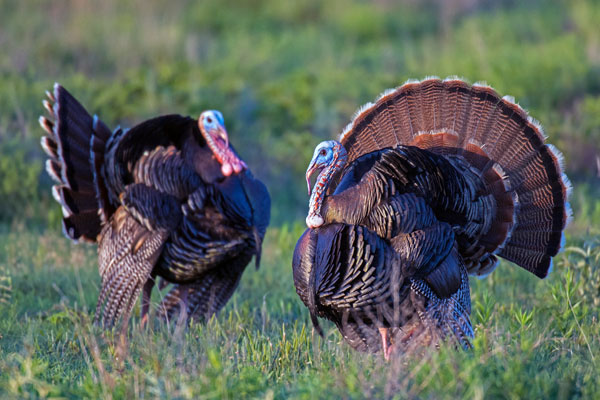

Hi, I’m Ryan
At first, I thought raising turkeys and chickens together would be a walk in the park, but along the way, I had to muddle through a learning curve. Now that I’ve successfully mingled these birds, I’ve built a strong foundation and management protocol to help make it easier when pairing flocks to come.

Can Turkeys And Chickens Live Together?

The short answer is yes, turkeys and chickens can live together, but it requires careful planning and management. While both species are poultry and share some similarities in their care, they also have distinct needs and behaviors that you should consider.
On the other hand, chickens can carry diseases that can spread to the turkeys, proving a health risk to the whole flock. Let’s take a closer look at the benefits vs. risks.
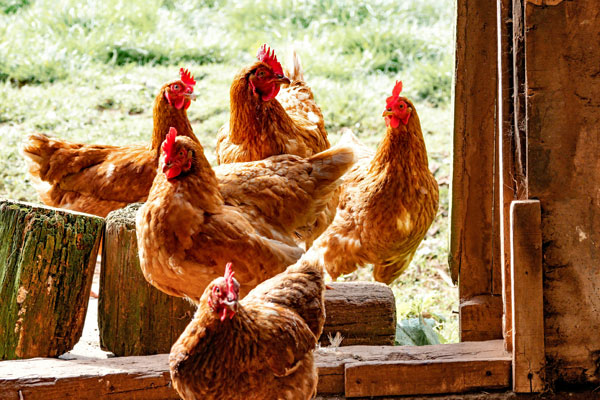
Why Raise Your Turkeys And Chickens Together?

You might raise turkeys and chickens together on your farm or homestead for several reasons. Despite their difference in personalities, turkeys and chickens can coexist peacefully with adequate space, proper supervision, and appropriate introductions.
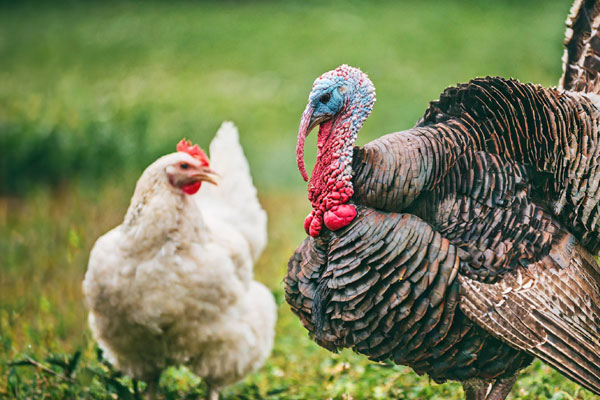 For me, one major advantage of raising turkeys and chickens together is the potential for improved pest control. Turkeys are excellent foragers and can help keep my backyard’s bothersome insect populations in check. At the same time, I’ve found that chickens are skilled at hunting down smaller and sometimes feistier pests like ticks and beetles.
For me, one major advantage of raising turkeys and chickens together is the potential for improved pest control. Turkeys are excellent foragers and can help keep my backyard’s bothersome insect populations in check. At the same time, I’ve found that chickens are skilled at hunting down smaller and sometimes feistier pests like ticks and beetles.
In any case, it’s essential to know what you’re getting into, and we’ll talk more about the benefits below. But first, we need to address the risks and challenges of raising turkeys and chickens together on your homestead.
Risks Of Raising Turkeys With Chickens

Before starting any new venture, especially with live animals, it’s crucial to understand the potential risks. Blackhead disease management is critical here and definitely the most important risk to consider. Both turkeys and chickens can catch infections and parasites, which require maintaining clean living spaces and staying vigilant for signs and symptoms of disease.
Blackhead Disease
In my opinion, the biggest concern is the possibility of Blackhead disease. Blackhead, caused by a parasite, primarily affects turkeys but can infect chickens with milder symptoms. To prevent this disease, make sure you keep the coop clean of droppings and limit overcrowding of the birds. The parasite loves hiding in bird droppings and hitching rides on earthworms. I find it best to keep your birds away from areas with lots of earthworms wiggling around.
 The issue is that this disease can spread rapidly within a mixed-species flock, and it’s particularly devastating for turkeys, leading to high death rates. Spread by the cecal worm, infected birds may show symptoms such as lethargy, diarrhea, and yellowish discoloration of the skin and wattles.
The issue is that this disease can spread rapidly within a mixed-species flock, and it’s particularly devastating for turkeys, leading to high death rates. Spread by the cecal worm, infected birds may show symptoms such as lethargy, diarrhea, and yellowish discoloration of the skin and wattles.
In severe cases, Blackhead disease can cause liver damage, which is deadly for most turkeys. Luckily, there are preventative measures such as keeping an eye out for the signs and symptoms of this disease and even having a chat with your local veterinarian.
My local vet told me that if a chicken contracts Blackhead disease while living with turkeys, immediately isolate the infected chicken to prevent spreading. If you’re unsure, go to the vet for diagnosis and treatment.
Regardless, it’s a good idea to quarantine the chicken in a separate area, ensuring cleanliness and no shared food or water. Monitor the turkeys closely for symptoms and prevent future outbreaks with strict hygiene protocols.
Ask your local vet if Blackhead disease is common in your region before cohabitating your birds. If the risk is high, you may choose to keep them separate. If Blackhead disease strikes, swift action, isolation, and veterinary consultation are vital to controlling and safeguarding your chickens and turkeys.
Problems In The Coop
I’ve also found that raising turkeys and chickens together can sometimes pose challenges within the coop environment.
The key here is providing ample space so the birds aren’t overcrowded. Multiple roosting options and segregated feeding areas can minimize competition and reduce stress within the flock. In the shared coop, I recommend at least 15 square feet of space per turkey and 3 square feet per chicken.
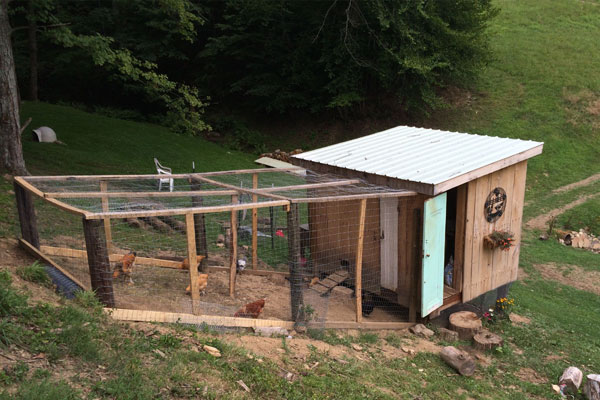
Brooding Issues
Brooding young turkeys and chickens together can present another level of challenges due to differences in their growth rates and nutritional requirements. For example, turkeys grow faster than chickens and have higher protein requirements during the first six weeks of development. What I’ve learned is that it’s beneficial to feed the young turkeys and chickens separately.
Turkeys are also more susceptible to sicknesses due to drafts and temperature fluctuations than chickens, making it essential to provide adequate heat and shelter during the brooding period. I recommend adhering to the space guidelines I detailed above to prevent illness and overcrowding stress.
How To Keep Chickens And Turkeys Healthy Together?

Maintaining the health and well-being of turkeys and chickens in a mixed-species flock requires diligent management and attention to detail.
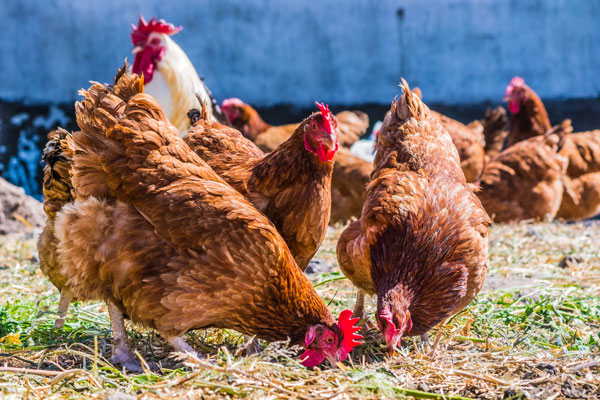 I like to take proactive measures, including parasite monitoring, symptom and behavior monitoring, and keeping their food and water clean. These simple but effective measures can prevent disease outbreaks and promote overall flock health.
I like to take proactive measures, including parasite monitoring, symptom and behavior monitoring, and keeping their food and water clean. These simple but effective measures can prevent disease outbreaks and promote overall flock health.
Some homesteaders opt to vaccinate their birds for various diseases and parasites. Still, I’ve found it unnecessary as my flock is relatively small, and extensive vaccinations can become costly, and, honestly, it’s something I’d rather avoid. Here, I’ve listed some things you need to know to keep your chickens and turkeys healthy together.
Following these guidelines and staying vigilant can help you ensure the well-being of raising turkeys and chickens in a mixed-species flock.
Keeping Chickens And Turkeys Healthy Together
- Regularly visually monitor your flock for parasites in feces.
- Pay attention to any changes in their behavior or any injuries.
- Provide balanced nutrition tailored to each species’ dietary requirements, monitoring feed consumption and adjusting as needed.
- Ensure a clean, comfortable living environment with proper ventilation and ample space for movement and exercise.
Benefits Of Raising Turkeys And Chickens Together

Raising turkeys and chickens together in a backyard turkey coop can offer several advantages for poultry lovers, despite the potential risks I’ve mentioned. Cohabitation can provide your feathery friends with a social circle, help you use your land more effectively, and take care of some nasty pests that infiltrate your homestead. Understanding these benefits can help inform decision-making and management practices on your homestead.
Social Dynamics
Introducing turkeys into a flock of chickens can enhance social dynamics and promote natural behaviors within the group. I love that turkeys are highly social birds that thrive on companionship and interaction with other poultry. That means integrating turkeys into a mixed-species flock can provide chickens with additional companionship and enrichment opportunities, improving their behavioral health and social lives and making them less stressed out and less likely to pick fights with their coop mates.
Space Efficiency
As a tiny house enthusiast, I am all about using space efficiently, and my experience has shown that combining housing and outdoor areas for both turkeys and chickens can effectively utilize land and resources on the farm while ensuring their well-being. To achieve this harmony, it’s crucial to address the unique requirements of each species. Though ample space is needed, you can still save space and resources as the roommate birds share their household amenities under one roof rather than two entirely separate coops.
Disease And Pest Control
Right off the bat I noticed that the presence of both turkeys and chickens in a mixed-species flock can help control pests and reduce the risk of diseases through their very own natural behaviors, such as foraging and dust bathing. Remember, turkeys and chickens can feast and forage on insects that could harm us humans, like Lyme disease-carrying ticks.
Considerations For Raising Turkeys And Chickens Together

When raising turkeys and chickens together, it’s best to acknowledge the differences in their social structures and behaviors, which can impact their interactions within the flock.
Turkeys And Chickens Social Structures And Behaviors
- Chickens can be attracted to a turkey’s feathered tail, leading to potential feather pecking if not addressed promptly.
- Turkeys may display aggressive behaviors to establish dominance, such as gobbling loudly, puffing up their feathers, and some pestering pecks.
- To foster positive interactions and prevent aggression, intervene quickly if you see any bullying.
- Provide ample space, enrichment opportunities, and distractions to help minimize stress and promote harmonious social dynamics among the birds.
- Activities such as perching, dust bathing, and foraging help alleviate boredom, aggression, and undesirable behaviors like feather pecking.
- Integrating natural elements like logs, branches, and vegetation into their environment encourages exploration and stimulates innate behaviors.
What About Keeping Turkeys With Ducks?

Can turkeys live with ducks? Though I’ve never combined them, some of my close homesteading friends assure me that careful management makes raising ducks and turkeys together feasible. Ducks and turkeys have different habitat preferences and dietary needs, but they can coexist harmoniously under certain conditions.
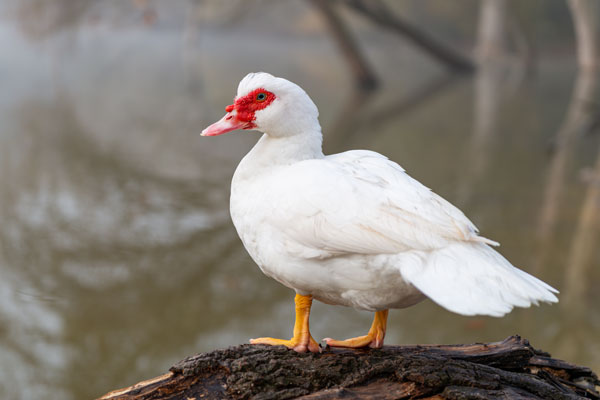 One big difference is that ducks require access to water for bathing and foraging, while turkeys prefer drier environments. Providing separate feeding and watering stations can help prevent competition and ensure that each species receives the nutrition they need. Also, maintaining clean and spacious living quarters is essential to prevent overcrowding and minimize disease transmission risk, just like with chickens.
One big difference is that ducks require access to water for bathing and foraging, while turkeys prefer drier environments. Providing separate feeding and watering stations can help prevent competition and ensure that each species receives the nutrition they need. Also, maintaining clean and spacious living quarters is essential to prevent overcrowding and minimize disease transmission risk, just like with chickens.
By carefully considering these factors and implementing appropriate preventative measures, homesteaders like you and I can create a harmonious environment for raising turkeys and chickens together. Addressing aspects such as housing, nutrition, disease management, behavioral compatibility, and environmental enrichment helps minimize risks and promotes the overall health and well-being of both turkeys and chickens in a mixed-species flock.
Your Turn!
- Are you planning to have your chickens and turkeys live together?
- Are your turkeys or chickens better at foraging pests?







Leave a Reply